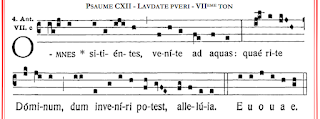And the antiphon's Psalm, Psalm 112; it is the penultimate Psalm chanted at this Hour. At the beginning of the Psalm, the antiphon is sung to the small bar (which of course has a name that I've never managed to keep in my head); it is sung in full at the end: but on feasts of higher rank, the antiphon is doubled i.e. sung in full both before and after the Psalm. This practice of doubling the antiphons was suppressed in the Pauline Rite, wherein the entirety of the antiphons are semper et ubique sung in full both before and after their Psalms. This would be of greater moment to me if there were any occasion, ever, to hear the chanting of the Hours in a local church; as it is, I keep the traditional practice, my natural preference, as it were, other things being equal. (There is of course the question, how actually 'traditional' is the traditional practice: I don't know but I'm sure I could search and learn.) There is also, however, when the entire Office is sung in choir, the question of a certain additional time involved when the antiphons are sung in full-- but from my vantage as a layman, the more the better, I suppose.
Antiphona. Omnes sitiéntes...
Laudáte, púeri, Dóminum: * laudáte nomen Dómini.[fit reverentia] Sit nomen Dómini benedíctum, * ex hoc nunc, et usque in sǽculum.
A solis ortu usque ad occásum, * laudábile nomen Dómini.
Excélsus super omnes gentes Dóminus, * et super cælos glória ejus.
Quis sicut Dóminus, Deus noster, qui in altis hábitat, * et humília réspicit in cælo et in terra?
Súscitans a terra ínopem, * et de stércore érigens páuperem:
Ut cóllocet eum cum princípibus, * cum princípibus pópuli sui.
Qui habitáre facit stérilem in domo, * matrem filiórum lætántem.
V. Glória Patri, et Fílio, * et Spirítui Sancto.
R. Sicut erat in princípio, et nunc, et semper, * et in sǽcula sæculórum. Amen.
Antiphona. Omnes sitiéntes, veníte ad aquas: quǽrite Dóminum, dum inveníri potest, allelúja.



Comments
Post a Comment